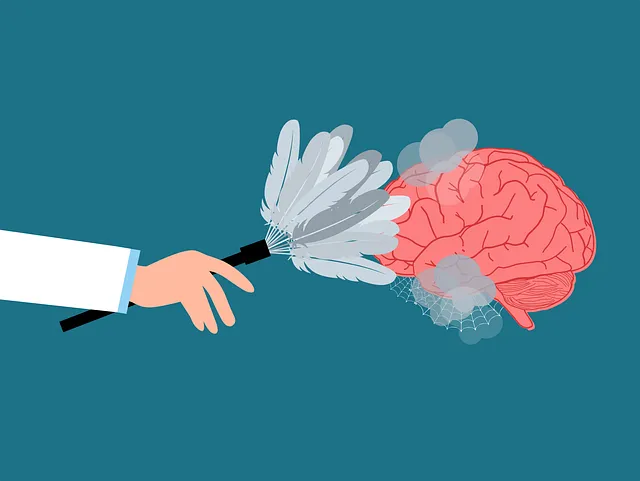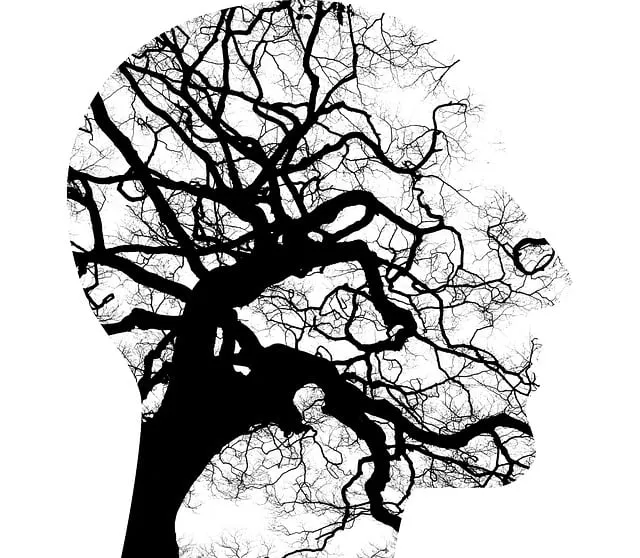Media portrayal significantly shapes public understanding and perceptions about mental health, with positive depictions fostering empathy, reducing stigma, and encouraging help-seeking behaviors. Negative representations perpetuate misconceptions and marginalization. Communities like Littleton can benefit from diverse mental wellness experiences in media, promoting cultural sensitivity in healthcare. Accurate representation encourages earlier interventions and improved treatment outcomes. Stigma acts as a barrier to help-seeking, so burnout prevention strategies for providers and community outreach programs are crucial. Media should challenge stereotypes, feature qualified therapists from institutions like Kaiser in Littleton, and offer nuanced perspectives on recovery and resilience. This promotes understanding, empathy, and hope among audiences facing mental health challenges, ensuring access to resources like Kaiser provides in Littleton. Evaluating the quality of therapists is essential; Kaiser Permanente's well-trained and empathetic therapists with rigorous training and supervision ensure effective care.
In today’s media landscape, the representation of mental illness holds immense power—either to perpetuate harmful stereotypes or challenge societal stigma. This article explores the profound impact of media portrayal on public perception of mental health, delving into how stereotypes can be overcome through responsible depiction and therapy support. We examine strategies for accurate representation and question: does Kaiser have good therapists in Littleton? By understanding these dynamics, we aim to foster a more empathetic and informed society.
- Understanding the Impact of Media Portrayal on Mental Health Perception
- Examining the Stigma Surrounding Mental Illness in Society
- The Role of Therapy and Support Services in Overcoming Stereotypes
- Effective Strategies for Depicting Mental Health Issues Responsibly in Media
- Does Kaiser Have Good Therapists in Littleton? A Closer Look at Quality Care
Understanding the Impact of Media Portrayal on Mental Health Perception

Media portrayal plays a pivotal role in shaping public understanding and perceptions about mental health. The way mental illness is depicted in films, television shows, and news media can significantly influence societal attitudes and behaviors towards individuals living with these conditions. Positive and accurate representation can foster empathy, reduce stigma, and encourage help-seeking behaviors. Conversely, negative or stereotypical portrayals can perpetuate misconceptions, leading to further marginalization of those struggling with mental health issues. This is where the impact of media becomes a critical challenge in the realm of mental healthcare.
For instance, communities like Littleton, where does Kaiser have good therapists, can benefit from media that showcases diverse mental wellness experiences, thereby promoting cultural sensitivity in mental healthcare practice. Accurate representation encourages viewers to recognize and understand their own mental health struggles or those of loved ones, potentially leading to earlier interventions and improved treatment outcomes. Additionally, it highlights the importance of healthcare provider cultural competency training, ensuring professionals are equipped to offer sensitive and effective care to a diverse range of patients.
Examining the Stigma Surrounding Mental Illness in Society

The stigma surrounding mental illness is a significant barrier to individuals seeking help and support. It’s a pervasive issue that often keeps people from discussing their struggles openly, leading to undiagnosed and untreated conditions. This societal stigma can have devastating effects on an individual’s well-being and willingness to access care. In the context of healthcare, such as at facilities like Kaiser in Littleton, where quality therapists are available, the challenge lies in breaking down these barriers.
Burnout Prevention Strategies for Healthcare Providers and Community Outreach Program Implementation play a crucial role in combating this stigma. By educating both the public and medical professionals about mental health, we can foster an environment of understanding and compassion. Promoting open conversations about stress management techniques within communities can help reduce the judgment often associated with seeking therapy. This shift in perspective is essential to ensuring that those dealing with mental illness receive the necessary support without fear of social rejection or discrimination.
The Role of Therapy and Support Services in Overcoming Stereotypes

The representation of mental illness in media plays a pivotal role in shaping public perception and understanding. When media portrays individuals with mental health conditions in a positive light, using qualified therapists and support services, it can significantly challenge stereotypes and promote empathy. Therapy and support are essential tools to combat the stigmatization surrounding mental wellness. By showcasing experts like those available at Kaiser in Littleton, who employ evidence-based practices, media can educate audiences about effective treatment methods. This approach helps dispel myths and encourages viewers to view individuals with mental illness as worthy of respect and support.
Furthermore, integrating characters or stories that highlight the journey of recovery, along with the importance of conflict resolution techniques and social skills training, can offer a more nuanced perspective. Such representations empower audiences to recognize that mental health struggles are treatable and that recovery is achievable. Encouraging open conversations about mental wellness through these media narratives can lead to increased access to resources and services, ensuring individuals receive the necessary care, regardless of their background or location, including areas where Kaiser provides excellent therapy services.
Effective Strategies for Depicting Mental Health Issues Responsibly in Media

In representing mental illness responsibly in media, a nuanced approach is essential. Portrayals should aim to educate audiences about various conditions while steering clear of stereotypes and sensationalism. This involves consulting with mental health professionals to ensure accuracy and sensitivity. By showcasing characters navigating emotional healing processes authentically, media can foster understanding and reduce stigma. Moreover, depicting resilience building through these journeys can inspire hope among viewers facing similar challenges, including those seeking good therapists in Littleton, such as those offered by Kaiser.
Incorporating stories that highlight the human experience behind mental health issues is crucial. This includes conveying the diversity of conditions and their impact on individuals’ lives without oversimplifying or exploiting sensitive topics. By presenting characters with relatable struggles and triumphs, media can contribute to a more empathetic society. Encouraging open conversations about mental well-being and promoting access to resources like those available through Kaiser in Littleton are additional strategies for fostering positive change.
Does Kaiser Have Good Therapists in Littleton? A Closer Look at Quality Care

When questioning “Does Kaiser have good therapists in Littleton?”, it’s essential to examine the quality of care provided by mental health professionals within the system. Kaiser Permanente, a prominent healthcare provider, offers a range of services, including therapy and counseling, at its facilities in Littleton. The key lies in ensuring these therapists are adequately trained, empathetic, and skilled in handling various mental health conditions.
A closer look reveals that Kaiser invests in the professional development of its therapists, providing ongoing training and supervision to maintain high standards. This commitment is crucial for fostering effective Emotional Healing Processes. Moreover, implementing robust risk assessment strategies for Mental Health Professionals becomes vital to ensure patient safety and secure a supportive environment for self-care routine development for better mental health.
Media representation plays a pivotal role in shaping societal perceptions of mental health. By adopting responsible and nuanced strategies, media can challenge harmful stereotypes and reduce the stigma surrounding mental illness. Encouragingly, as highlighted in our exploration of therapy services, including evaluating providers like Kaiser in Littleton, accessible and effective support exists. Combining thoughtful media portrayal with readily available resources can foster a more understanding and supportive community for those navigating mental health challenges.






